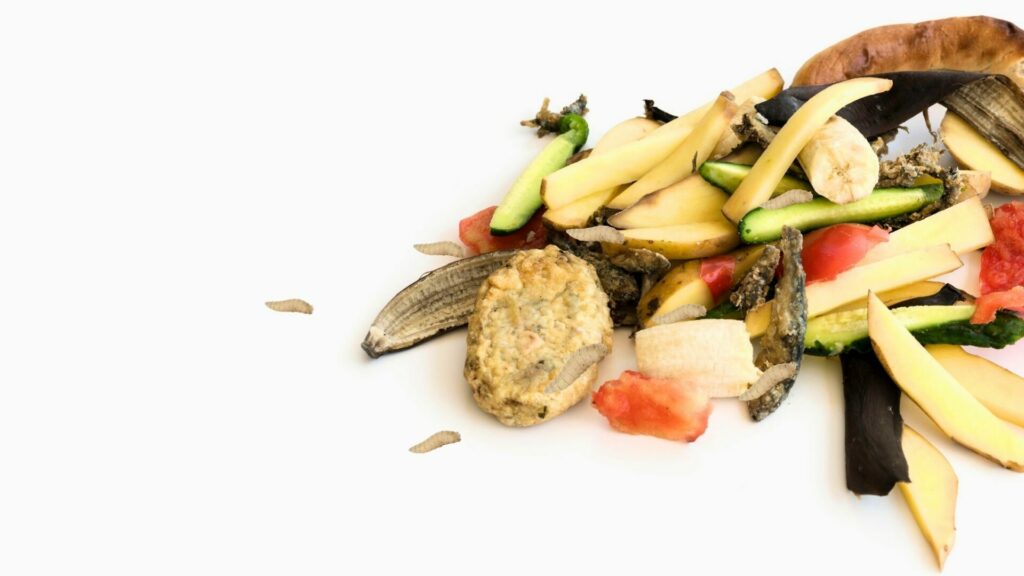BIOvative Magazine » Maden in der Biotonne
Maggots in the organic waste bin: What to do?
Contents
- This helps against maggots in the organic waste garbage can
- The right location for the organic waste garbage can
- Avoid humidity
- Keep garbage cans properly clean
- Organic waste garbage can as a buffet for birds
- Home remedy for maggots
- Avoid foul odors
- How do maggots develop in the organic waste garbage can?
- Are maggots dangerous?
- Avoid maggots with organic bags
Maggots in the organic waste bin: What to do?
- 23. January 2025
- Autor: Uwe Friebel
- Lesezeit: 10 Minuten
The organic waste garbage can is practical, environmentally friendly – and in summer a welcome home for all kinds of vermin. When temperatures are pleasantly warm, maggots and flies quickly swarm in the organic waste. This is unpleasant and a real problem for many people who enjoy using the organic waste garbage can. That’s why we’ve put together some valuable tips on what you can do about maggots in your organic waste garbage can.
This helps against maggots in the organic waste garbage can
To keep maggots out of the organic garbage can, there are basically three big rules:
- Avoid humidity
- Reduce soiling
- Minimize odors
If you follow these three principles, you will have from the beginning less problems with maggots in the organic waste garbage can than before. There are a few tricks to help you with this. We have compiled the best ones below.
One thing is generally true: Do not use any chemical or insecticide-containing preparations. These toxins will otherwise end up in the compost and can have health consequences for everyone.
The right location for the organic waste garbage can
The most important thing against maggots in the organic waste garbage can is the right location. Make sure that the location of your garbage can:
- dry,
- shady and cool
- and sheltered from the wind.
By protecting your organic waste garbage can from rain, you automatically reduce the moisture in the garbage can. Protection from the sun prevents the contents from heating up. This helps insofar as heat supports the rotting processes and thus the development of odors – without strong odors, the bio garbage can is also not so inviting to flies. Last but not least, the garbage can should be placed protected from the wind so that the lid remains closed at all times. This is the easiest way to prevent flies from getting into the garbage can in the first place.
Avoid humidity
Moisture in the organic waste garbage can is one of the main reasons for vermin infestation. This is because the moisture causes bad odors to develop more quickly, attracting flies. In addition, a warm and humid climate is not only the perfect breeding ground for bacteria and mold, but also a nice home for flies and their larvae. You can reduce humidity with these tricks:
- Use compostable liner bags for your organic waste garbage can. This not only keeps your garbage can clean and dry, preventing odors and infestation by maggots. The bag can also be disposed of directly with your organic waste via the organic waste garbage can.
- Alternatively you can line the bottom of the bio garbage can with newspaper. Thus, moisture at the bottom of the barrel is absorbed directly. Also slaked lime or rock flour on the bottom of the barrelbinds the moisture, but is not a pollution for the compost.
- Do not simply throw organic waste of animal origin into the organic waste garbage can, but wrap the waste in some kitchen paper or newspaper. This way you kill two birds with one stone: the moisture is reduced and flies can no longer lay their eggs in this waste. Because just protein-rich food scraps are preferred by flies for laying eggs, because they are an optimal food base for the maggots.
- Let green waste, i.e. lawn clippings, leaves or cut flowers, dry or wilt before you throw them into the garbage can. When fresh, green waste still gives off too much moisture.
Keep garbage cans properly clean
A clean organic waste garbage can is not a good home for flies and their maggots. Accordingly, regular cleaning of the bio bin can be the most efficient way to prevent long-term vermin infestation. In our post “What is the bio garbage can?” we explain to you exactly how to go about cleaning it.
Even easier than cleaning the organic garbage can after each emptying is to equip the garbage can with suitable organic waste bags. BIOvative’s liner bags are available for organic and residual waste garbage cans and are 100 percent compostable. You can buy the bags in 120 liter and 240 liter sizes.
The bags have the advantage that they not only prevent contamination, but due to the leak-proof material they also reduce moisture in the organic waste garbage can. This prevents bad odors from developing in the first place. In addition, you clamp the bags over the edge of the garbage can – this creates an additional seal to prevent flies from getting into the garbage can.
Organig waste garbage can as a buffet for birds
If the maggots are already there, you can also try to solve the problem via natural predators. This means: Leave the garbage can open for an hour or two in the morning and invite the birds in your neighborhood to a buffet. Fly larvae are a welcome bird food, making the organic waste garbage can an all-you-can-eat buffet.
However, this solution has its weaknesses. In case of doubt, the open garbage can leads to the birds helping themselves to the maggots, but in the meantime other flies can lay new eggs in the garbage can.
On the other hand, the open bin can also attract other pests such as rats, mice or even raccoons. So, wildlife may not only eat up the maggots, but also pick apart the other waste from your garbage can and spread it around the garbage can. So, in case of doubt, you invite more animals to feast than you get rid of this way.
Home remedy for maggots
Whether the maggots are already living in the organic garbage can or you are trying to keep them out: There are some home remedies or homemade tricks that help deal with the problem.
- vinegar water: You can use the simple mixture of vinegar essence and warm water either to drive away the maggots or to prevent them from making themselves too at home. If you want to prevent infestation with maggots in the organic waste garbage can, spray all surfaces of the garbage can well with the vinegar water after cleaning. However, it is important to let the garbage can dry well afterwards!
- More fragrant than vinegar are fruity essential oils. For example, you can soak a cloth with citrus oil, lavender oil or tea tree oil. Afterwards, place the cloth between the lid and the garbage can. The smell will drive away bugs and won't stink too much, even if the garbage can is right in front of your kitchen window.
- Quick help from grandma's curtain! You can also build a mechanical fly barrier that prevents maggots from becoming a problem in the first place. To do this, simply sew an elastic band all around a piece of curtain. So you can stretch the curtain like a net over the barrel opening - voila, flies must stay outside!
- Is the organic waste garbage can already full of maggots? Then pepper water will help in case of doubt. Just boil some water and add a tablespoon of pepper. After cooling down, you can spray the mixture on the maggots - even if this is a rather unpleasant experience for the animals themselves. Afterwards, you can remove the dead maggots and clean the garbage can.
- Another secret tip against heavy maggot infestation is a mixture of water, salt and vinegar. You can use this just like the pepper water. However, experts advise against this solution, because the salt can later contaminate the compost and is therefore considered unsuitable for the organic waste garbage can.
Avoid foul odors
In our article “What is the organic waste garbage can?” we already tell you a few things about how you can get odors in the organic waste garbage can under control. The step of reducing moisture is already half the battle.
In addition to regular cleaning, it’s better to empty the garbage can more often than not, especially in summer. The less organic waste that rots in the garbage can, the less inviting the garbage can is for flies and other vermin.
A tip that is especially good for people with small animals or in rural areas: dried hay, which lands in the garbage can every now and then as a buffer layer, binds bad odors.
How do maggots develop in the organic waste garbage can?
Organic waste is a magnet for vermin because it is both food and breeding ground. The maggots in the organic waste garbage can are the best example of this: they come mainly from houseflies, fruit flies and blowflies. All three species of flies prefer a warm, moist environment to lay their eggs. In addition, the rich mixture of vitamins, nutrients and proteins is virtually a land of milk and honey for growing fly maggots.
The flies are attracted by the odors produced during the rotting processes in the organic waste garbage can. Fruit flies prefer to look for the source of alcoholic-acetic acid odors. These are often caused by rotting fruit and vegetable debris. Houseflies and blowflies, on the other hand, prefer places that smell like hydrogen sulfide and butyric acid. This is especially the case in places with decomposing animal waste.
So the organic waste garbage can is something of a fly paradise.
In addition, the lid on the garbage can protects the maggots from predators. Of the 150 eggs that a fly can lay at one time, a relatively large number of larvae survive.
Are maggots dangerous?
In principle, maggots in the organic waste garbage can are harmless. They do not bite or sting and are not toxic in themselves. Many people find them disgusting. However, the flies that grow from the maggots can transmit diseases or contribute to the rapid spread of diseases. Therefore, large quantities of fly maggots are always considered a hygiene risk.
Avoid maggots with organic bags
Maggots in the organic waste garbage can are annoying and unpleasant – and not a problem you have to deal with for long. With the organic waste bags from BIOvative, you can simply line your organic garbage can and thus significantly reduce the infestation with vermin. Our garbage bags are fully compostable – and have been awarded the DINPlus certificate, the “Keimling” and the OK Compost HOME seal for this.
Don’t miss any of our articles in the magazine – sign up for our newsletter! For exciting information about sustainable everyday life, follow us on our social media channels or send us a message!

Uwe Friebel

Uwe Friebel
These articles may also interest you

Our promise
Sustainability is on everyone’s lips and has never been as relevant as it is today. If you’re rolling your eyes right now because you’re sick

Our values
Make the difference in every aspect. We want SUSTAINABILITY – WITHOUT compromise In these times, when you often can’t be sure if there is “sustainability”

Our values
Make the difference in every aspect. We want SUSTAINABILITY – WITHOUT compromise In these times, when you often can’t be sure if there is “sustainability”



